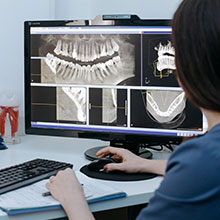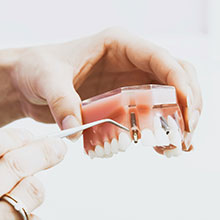Endodontics
ROOT CANAL TREATMENT BY SAVING INFECTED TEETH AND PREVENTING FURTHER DENTAL PROBLEMS
At Smile Avenue, we offer expert root canal treatment to help save infected teeth and prevent the need for extraction. Many people worry about root canals, but the truth is, with modern techniques and local anaesthesia, the procedure is comfortable and highly effective.
If you are experiencing tooth pain, sensitivity, or swelling, a root canal might be the solution you need to restore your dental health.
What is Root Canal Treatment?
Root canal treatment is a safe and effective procedure that removes infection from the inside of a tooth.
Inside every tooth, there is soft tissue called the pulp, which contains nerves and blood vessels. This tissue can become infected due to:
- Tooth decay – When a cavity becomes too deep and allows bacteria to enter.
- Cracked or damaged teeth – Even small cracks can let bacteria inside.
- Repeated dental treatments – A history of multiple fillings in the same tooth.
When bacteria infect the pulp, it can cause pain, swelling, and sensitivity to hot or cold foods. If left untreated, the infection can spread to the gums and surrounding bone, leading to more serious problems.
Root canal treatment removes the infected pulp while keeping the outer structure of the tooth intact, preventing further damage and avoiding the need for extraction.
Why Choose Root Canal Treatment?
Many people think that pulling a tooth is easier than having a root canal, but that’s not always the best choice. Here’s why:
- Saves Your Natural Tooth
- Removing the pulp stops the infection while keeping the outer structure of your tooth intact.
- Avoids the need for costly treatments like bridges or implants to replace a missing tooth.
- Stops the Infection From Spreading
- A root canal removes all bacteria from inside the tooth.
- The tooth is sealed to prevent reinfection, keeping your mouth healthy.
- Relieves Pain and Sensitivity
- Many patients feel immediate relief after their root canal treatment.
- Eliminates throbbing pain and discomfort caused by infection.
- A Comfortable and Pain-Free Procedure
- Root canals have a reputation for being painful, but this is a myth.
- We always use local anaesthesia to make sure you don’t feel pain during treatment.
- For very nervous patients, we offer sedation to help you relax.
What Happens During Root Canal Treatment?
Root canal treatment usually takes two or more appointments, depending on the complexity of the infection. Here’s what you can expect:
Step 1: Examination and Diagnosis
- We begin by taking an X-ray to check the condition of the root canals and surrounding bone.
- We examine your tooth and discuss your symptoms.
- If a root canal is needed, we apply local anaesthetic to numb the area before treatment.
Step 2: Cleaning the Infection
- A rubber sheet (dental dam) is placed around the tooth to keep it dry and bacteria-free.
- We remove the infected pulp and bacteria from inside the tooth.
- The root canals are flushed with an antibacterial solution to remove any remaining infection.
Step 3: Shaping and Sealing the Canals
- We shape the root canals with tiny instruments to prepare them for filling.
- The canals are washed again to remove any leftover debris.
- The freshly cleaned canals are then filled with a special rubber-like material to seal the tooth and prevent reinfection.
Step 4: Restoring the Tooth
- A temporary filling is placed to protect the tooth between appointments.
- In the final stage, the tooth is sealed with a permanent filling or crown to restore its shape and function.
By the end of treatment, your tooth will be free of infection, pain, and discomfort.
Caring for Your Treated Tooth
After a root canal, it’s important to take care of your treated tooth to ensure long-term success. Here’s how:
- Brush and floss daily to maintain good oral hygiene.
- Avoid biting hard foods (such as ice or nuts) to prevent damage.
- Attend regular check-ups to monitor the health of the treated tooth.
- If a crown was recommended, make sure to have it placed for extra strength and protection.
With proper care, a root canal-treated tooth can last for many years, allowing you to eat, smile, and speak with confidence.
Frequently Asked Questions About Root Canals
Will a root canal hurt?
No. The procedure is done under local anaesthesia, which means you won’t feel any pain. If you are nervous, we also offer sedation options to help you feel more comfortable.
How long does a root canal take?
Most root canals take two or more visits. The first visit focuses on removing the infection, while the second visit seals and restores the tooth.
Will I need a crown after a root canal?
In some cases, yes. If the tooth is badly damaged or weak, a crown is recommended to strengthen and protect it.
How much does a root canal cost?
The cost depends on the complexity of the tooth and whether a crown is needed. During your consultation, we will provide a detailed treatment plan with clear pricing.




